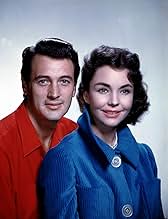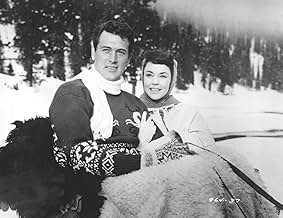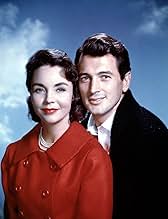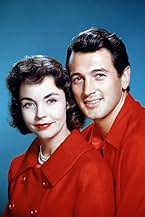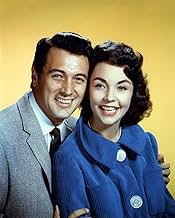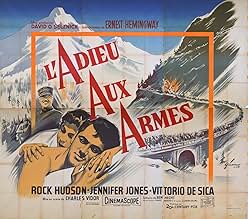An English nurse and an American ambulance driver on the Italian front during World War 1 fall in love, but the horrors surrounding them challenge their romance to the limit.An English nurse and an American ambulance driver on the Italian front during World War 1 fall in love, but the horrors surrounding them challenge their romance to the limit.An English nurse and an American ambulance driver on the Italian front during World War 1 fall in love, but the horrors surrounding them challenge their romance to the limit.
- Directors
- Writers
- Stars
- Nominated for 1 Oscar
- 1 win & 2 nominations total
- Major Stampi
- (as Jose Nieto)
- Captain Bassi
- (as Georges Brehat)
- Court Martial Colonel
- (uncredited)
- Nino the Doorkeeper
- (uncredited)
- Directors
- Writers
- All cast & crew
- Production, box office & more at IMDbPro
Featured reviews
Amazing visually but dull
Jones was too old
Less is more
What is now obvious to me is that 1) the part I saw had little input from Jennifer Jones; 2) the emotion conveyed by Rock Hudson was deeply touching; 3) the setting was also memorable; 4) it was far too long. When viewing the film in its entirety, it is obviously badly in need of the touch of a good editor, although I was somewhat surprised to recently read that it is actually 2 hours and 32 minutes in length. What is particularly disappointing is that Jennifer Jones was clearly miscast, and yes - we all know why.
However, I have seen this actress in other productions - for example 'Gone to Earth', in which she was simply splendid; but her role in this film was most definitely not the kind of part she excelled in.
This could potentially have been Rock Hudson's finest hour, but as with other epic productions of the time e.g. Cleopatra, the best bits most probably ended up on the cutting room floor; however, that said, I can only think of a handful of films that have imprinted themselves on me like this one.
I would be interested in seeing a re-edited version of this with special features.
7 for at least one standout scene; a superb performance by Rock Hudson and its ability to touch someone.
How bout a review of the actual movie, people?
While this film may not deserve an Academy award for best picture, it certainly deserves a decent review on IMDb dedicated to the film itself. So here goes my attempt.
"A Farewell to Arms" is a lavish production of a love story set against the backdrop of World War I. In that respect it's in the same genre as other classic war romances "Gone with the Wind", "Casablanca" and "Platoon ". Haha just checking to see if you're paying attention. Everyone knows "Casablanca" was not set in a war but an occupation.
Where "Farewell" differs from these other classics is in the distribution of war & romance. "Farewell" features far more battle scenes (4) compared to "Gone with the Wind" (zero) and "Casablanca" (zero). The result may be a bit disappointing in the romance department, and several reviewers (as well as the New York Times review on the film's release) have complained about the "lack of chemistry" between the two leads. I think this perception is simply due to the fact that less time is spent setting up the romance, putting more of a burden on the viewer to accept a relationship that simply happens. Viewers may also feel romantically cheated because this is not a traditional romance between two traditional individuals who dream of immediately getting married and having kids and a dog. But in fact this purposely informal, slightly dysfunctional romance is what ultimately made it interesting to me because it marked a change of formula in the age-old Hollywood romance.
If you see this movie, pay close attention to Jennifer Jones' excellent portrayal of a reluctant lover who is perhaps suffering from too many demons to actually fall in love completely, the way she wants to. She is riddled with insecurities, conflicts and possibly guilt, making her like the the stereotypical guy who can't commit. Meanwhile Rock Hudson plays a character more like the stereotypical lovesick schoolgirl. If you enjoy stereotype reversals like this, you'll definitely find yourself interested in their "lack of chemistry".
Was Jennifer Jones too old (late 30s) to play the role of Katherine as Hemingway had intended her (early 20s)? Probably. Did Jennifer get the part because she was married to producer Selznick? Absolutely. Does any of this make her a bad actress? No way. Short of Vivien Leigh, I think she was the best person to play the role as she did: the troubled lover whose cynical, morbid thoughts were always brewing not far away, despite her outwardly cheerful appearance. Actually I take back the thing about Vivien Leigh being better; the more I think about it, Jennifer was ideal for this sort of character.
A subplot involving Vittorio de Sica's war-weary character descending into madness is sure to catch your attention. It was actually my favorite part of the movie, and I wish they had spent more time on this complex character shift as well as his interesting polite antagonism of the church (with a spectacular short speech he says to the priest near the end). But alas, with the romance and the battle scenes already vying for screen time, Vittorio's story only got 2 or 3 dedicated scenes. They were powerful nonetheless.
Yes, as others mentioned, the ending seemed abrupt. But after thinking about it, I think it was perfectly in line with some of the interesting & unusual themes that the story set up. In short, this is not a straightforward soldier-meets-girl love story. The conflicts that are presented (particularly in Jennifer Jones' mysteriously troubled psyche) make this romance much more than meets the eye. If you enjoy wartime romances that are not always formulaic love stories (i.e. they may contain hidden dysfunctional surprises), check this one out.
Knowing The Score
In this version Hudson is earnest but bland, Jones too old, De Sica in the wrong movie and Stritch, well, her acid nurse is one of the film's only bright spots.
But the real reason to see the film is the ravishing musical score by Mario Nasciembe. Talk about romantic! Talk about lush! Talk about unforgettable! Had the film been as good as it's musical score it would have been a classic; what A Farewell To Arms ultimately is though, is an overstuffed period piece and a tepid finale to the great David Selznick's career. (By the way should you want to skip the film, the soundtrack is currently available on CD.)
Did you know
- TriviaRock Hudson turned down The Bridge on the River Kwai (1957), Sayonara (1957) and Ben-Hur (1959) in order to make this film. He later said this was the biggest mistake of his career.
- GoofsCatherine is supposed to be British, yet she has an American accent.
- Quotes
Major Alessandro Rinaldi: The British have opened a new hospital near Orsino. I am now in love with one of the nurses, Miss Barkley. I have even thought of marrying Miss Barkley, but, I must confess, she has one drawback. Her attitude is uncooperative.
Lt. Frederick Henry: You must be slipping.
Major Alessandro Rinaldi: No, but she is very strange, very moody. Who knows. She might even prefer you to me.
- Crazy creditsProducer David O. Selznick tries to imitate the opening credits of his classic film, Gone with the Wind (1939), by having the letters of the title "A Farewell to Arms" sweep slowly across the screen from right to left.
- ConnectionsFeatured in The Time Tunnel: The Ghost of Nero (1967)
- How long is A Farewell to Arms?Powered by Alexa
Details
- Release date
- Country of origin
- Languages
- Also known as
- Adiós a las armas
- Filming locations
- Venzone, Udine, Friuli-Venezia Giulia, Italy(first 20 minutes)
- Production company
- See more company credits at IMDbPro
Box office
- Budget
- $4,353,000 (estimated)
- Gross worldwide
- $18,989
- Runtime
- 2h 32m(152 min)
- Color
- Aspect ratio
- 2.35 : 1


